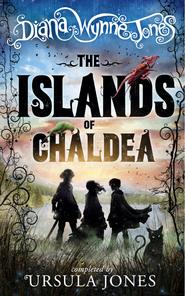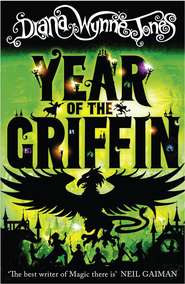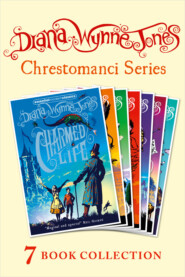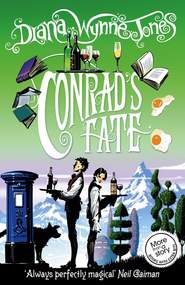По всем вопросам обращайтесь на: info@litportal.ru
(©) 2003-2024.
✖
Howl’s Moving Castle
Настройки чтения
Размер шрифта
Высота строк
Поля
Sophie did not trust herself to answer in her present mood. She went and got out hats. None of them were in this lady’s class, but she could feel the man’s eyes following her and that made her uncomfortable. The sooner the lady discovered the hats were wrong for her, the sooner this odd pair would go. She followed Fanny’s advice and got out the wrongest first.
The lady began rejecting hats instantly. “Dimples,” she said to the pink bonnet, and “Youth” to the caterpillar-green one. To the one of twinkles and veils she said, “Mysterious allure. How very obvious. What else have you?”
Sophie got out the modish black and white, which was the only hat even remotely likely to interest this lady.
The lady looked at it with contempt. “This one doesn’t do anything for anybody. You’re wasting my time, Miss Hatter.”
“Only because you came in and asked for hats,” Sophie said. “This is only a small shop in a small town, Madam. Why did you—” Behind the lady, the man gasped and seemed to be trying to signal warningly “—bother to come in?” Sophie finished, wondering what was going on.
“I always bother when someone tries to set themselves up against the Witch of the Waste,” said the lady. “I’ve heard of you, Miss Hatter, and I don’t care for your competition or your attitude. I came to put a stop to you. There.” She spread out her hand in a flinging motion towards Sophie’s face.
“You mean you’re the Witch of the Waste?” Sophie quavered. Her voice seemed to have gone strange with fear and astonishment.
“I am,” said the lady. “And let that teach you to meddle with things that belong to me.”
“I don’t think I did. There must be some mistake,” Sophie croaked. The man was now staring at her in utter horror, though she could not see why.
“No mistake, Miss Hatter,” said the Witch. “Come, Gaston.” She turned and swept to the shop door. While the man was humbly opening it for her, she turned back to Sophie. “By the way, you won’t be able to tell anyone you’re under a spell,” she said. The shop door tolled like a funeral bell as she left.
Sophie put her hands to her face, wondering what the man had stared at. She felt soft, leathery wrinkles. She looked at her hands. They were wrinkled too, and skinny, with large veins in the back and knuckles like knobs. She pulled her grey skirt against her legs and looked down at skinny, decrepit ankles and feet which had made her shoes all knobbly. They were the legs of someone about ninety and they seemed to be real.
Sophie got herself to the mirror, and found she had to hobble. The face in the mirror was quite calm, because it was what she expected to see. It was the face of a gaunt old woman, withered and brownish, surrounded by wispy white hair. Her own eyes, yellow and watery, stared out at her, looking rather tragic.
“Don’t worry, old thing,” Sophie said to the face. “You look quite healthy. Besides, this is much more like you really are.”
She thought about her situation, quite calmly. Everything seemed to have gone calm and remote. She was not even particularly angry with the Witch of the Waste.
“Well, of course I shall have to do for her when I get the chance,” she told herself, “but meanwhile, if Lettie and Martha can stand being one another, I can stand being like this. But I can’t stay here. Fanny would have a fit. Let’s see. This grey dress is quite suitable, but I shall need my shawl and some food.”
She hobbled over to the shop door and carefully put up the CLOSED notice. Her joints creaked as she moved. She had to walk bowed and slow. But she was relieved to discover that she was quite a hale old woman. She did not feel weak or ill, just stiff. She hobbled to collect her shawl, and wrapped it over her head and shoulders, as old women did. Then she shuffled through into the house, where she collected her purse with a few coins in it and a parcel of bread and cheese. She let herself out of the house, carefully hiding the key in the usual place, and hobbled away down the street, surprised at how calm she still felt.
She did wonder if she should say goodbye to Martha. But she did not like the idea of Martha not knowing her. It was best just to go. Sophie decided she would write to both her sisters when she got wherever she was going, and shuffled on, through the field where the Fair had been, over the bridge, and on into the country lanes beyond. It was a warm spring day. Sophie discovered that being a crone did not stop her enjoying the sight and smell of may in the hedgerows, though the sight was a little blurred. Her back began to ache. She hobbled sturdily enough, but she needed a stick. She searched the hedges as she went for a loose stake of some kind.
Evidently her eyes were not as good as they had been. She thought she saw a stick, a mile or so on, but when she hauled on it, it proved to be the bottom end of an old scarecrow someone had thrown into the hedge. Sophie heaved the thing upright. It had a withered turnip for a face. Sophie found she had some fellow feeling for it. Instead of pulling it to pieces and taking the stick, she stuck it between two branches of the hedge, so that it stood looming rakishly above the may, with the tattered sleeves on its stick arms fluttering over the hedge.
“There,” she said, and her cracked old voice surprised her into giving a cracked old cackle of laughter. “Neither of us are up to much, are we, my friend? Maybe you’ll get back to your field if I leave you where people can see you.” She set off up the lane again, but a thought struck her and she turned back. “Now if I wasn’t doomed to failure because of my position in the family,” she told the scarecrow, “you could come to life and offer me help in making my fortune. But I wish you luck anyway.”
She cackled again as she walked on. Perhaps she was a little mad, but then old women often were.
She found a stick an hour or so later when she sat down on the bank to rest and eat her bread and cheese. There were noises in the hedge behind her: little strangled squeakings, followed by heavings that shook may petals off the hedge. Sophie crawled on her bony knees to peer past leaves and flowers and thorns into the inside of the hedge, and discovered a thin grey dog in there. It was hopelessly trapped by a stout stick which had somehow got twisted into a rope that was tied round its neck. The stick had wedged itself between two branches of the hedge so that the dog could barely move. It rolled its eyes wildly at Sophie’s peering face.
As a girl, Sophie was scared of all dogs. Even as an old woman she was quite alarmed by the two rows of white fangs in the creature’s open jaws. But she said to herself, “The way I am now, it’s scarcely worth worrying about,” and felt in her sewing pocket for her scissors. She reached into the hedge with the scissors and sawed away at the rope round the dog’s neck.
The dog was very wild. It flinched away from her and growled. But Sophie sawed bravely on. “You’ll starve or throttle to death, my friend,” she told the dog in her cracked old voice, “unless you let me cut you loose. In fact, I think someone has tried to throttle you already. Maybe that accounts for your wildness.” The rope had been tied quite tightly round the dog’s neck and the stick had been twisted viciously into it. It took a lot of sawings before the rope parted and the dog was able to drag itself out from under the stick.
“Would you like some bread and cheese?” Sophie asked it then. But the dog just growled at her, forced its way out through the opposite side of the hedge, and slunk away. “There’s gratitude for you!” Sophie said, rubbing her prickled arms. “But you left me a gift in spite of yourself.” She pulled the stick that had trapped the dog out of the hedge and found it was a proper walking stick, well trimmed and tipped with iron. Sophie finished her bread and cheese and set off walking again. The lane became steeper and steeper and she found the stick a great help. It was also something to talk to. Sophie thumped along with a will, chatting to her stick. After all, old people often talk to themselves.
“There’s two encounters,” she said, “and not a scrap of magical gratitude from either. Still, you’re a good stick. I’m not grumbling. But I’m surely due to have a third encounter, magical or not. In fact, I insist on one. I wonder what it will be.”
The third encounter came towards the end of the afternoon when Sophie had worked her way quite high into the hills. A countryman came whistling down the lane towards her. A shepherd, Sophie thought, going home after seeing to his sheep. He was a well set up young fellow of forty or so. “Gracious!” Sophie said to herself. “This morning I’d have seen him as an old man. How one’s point of view does alter!”
When the shepherd saw Sophie mumbling to herself, he moved rather carefully over to the other side of the lane and called out with great heartiness, “Good evening to you, Mother! Where are you off to?”
“Mother?” said Sophie. “I’m not your mother, young man!”
“A manner of speaking,” the shepherd said, edging along against the opposite hedge. “I was only meaning a polite inquiry, seeing you walking into the hills at the end of the day. You won’t get down into Upper Folding before nightfall, will you?”
Sophie had not considered this. She stood in the road and thought about it. “It doesn’t matter really,” she said, half to herself. “You can’t be fussy when you’re off to seek your fortune.”
“Can’t you indeed, Mother?” said the shepherd. He had now edged himself downhill of Sophie and seemed to feel better for it. “Then I wish you good luck, Mother, provided your fortune don’t have nothing to do with charming folks’ cattle.” And he took off down the road in great strides, almost running, but not quite.
Sophie stared after him indignantly. “He thought I was a witch!” she said to her stick. She had half a mind to scare the shepherd by shouting nasty things after him, but that seemed a little unkind. She plugged on uphill, mumbling. Shortly, the hedges gave way to bare banks and the land beyond became heathery upland, with a lot of steepness beyond that covered with yellow, rattling grass. Sophie kept grimly on. By now her knobby old feet ached, and her back, and her knees. She became too tired to mumble and simply plugged on, panting, until the sun was quite low. And all at once it became quite clear to Sophie that she could not walk a step further.
She collapsed on to a stone by the wayside, wondering what she would do now. “The only fortune I can think of is a comfortable chair!” she gasped.
The stone proved to be on a sort of headland, which gave Sophie a magnificent view of the way she had come. There was most of the valley spread out beneath her in the setting sun, all fields and walls and hedges, the windings of the river, and the fine mansions of rich people glowing out from clumps of trees, right down to blue mountains in the far distance. Just below her was Market Chipping. Sophie could look down into its well-known streets. There was Market Square and Cesari’s. She could have tossed a stone down the chimney pots of the house next to the hat shop.
“How near it still is!” Sophie told her stick in dismay. “All that walking just to get above my own rooftop!”
It got cold on the stone as the sun went down. An unpleasant wind blew whichever way Sophie turned to avoid it. Now it no longer seemed so unimportant that she would be out on the hills during the night. She found herself thinking more and more of a comfortable chair and a fireside, and also of darkness and wild animals. But if she went back to Market Chipping, it would be the middle of the night before she got there. She might just as well go on. She sighed and stood up, creaking. It was awful. She ached all over.
“I never realised before what old people had to put up with with!” she panted as she laboured uphill. “Still, I don’t think wolves will eat me. I must be far too dry and tough. That’s one comfort.”
Night was coming down fast now and the heathery uplands were blue-grey. The wind was sharper. Sophie’s panting and the creaking of her limbs were so loud in her ears that it took her a while to notice that some of the grinding and puffing was not coming from herself at all. She looked up blurrily.
Wizard Howl’s castle was rumbling and bumping towards her across the moorland. Black smoke was blowing up in clouds from behind its black battlements. It looked tall and thin and heavy and ugly and very sinister indeed. Sophie leaned on her stick and watched it. She was not particularly frightened. She wondered how it moved. But the main thing in her mind was that all that smoke must mean a large fireside somewhere inside those tall black walls.
“Well, why not?” she said to her stick. “Wizard Howl is not likely to want my soul for his collection. He takes only young girls.”
She raised her stick and waved it imperiously at the castle.
“Stop!” she shrieked.
The castle obediently came to a rumbling, grinding halt about fifty feet uphill from her. Sophie felt rather gratified as she hobbled towards it.
CHAPTER THREE In which Sophie enters into a castle and a bargain (#ulink_0694baf1-0f39-5db1-9112-f95fa8471203)
There was a large black door in the black wall facing Sophie and she made for that, hobbling briskly. The castle was uglier than ever close to. It was far too tall for its height and not a very regular shape. As far as Sophie could see in the growing darkness, it was built of huge black blocks, like coal, and, like coal, the blocks were all different shapes and sizes. Chill breathed off these blocks as she got closer, but that failed to frighten Sophie at all. She just thought of chairs and firesides and stretched her hand out eagerly to the door.
Her hand could not come near it. Some invisible wall stopped her hand about a foot from the door. Sophie prodded at it with an irritable finger. When that made no difference, she prodded with her stick. The wall seemed to be all over the door from as high as her stick could reach, and right down to the heather sticking out from under the doorstep.
“Open up!” Sophie cackled at it.
That made no difference to the wall.
“Very well,” Sophie said. “I’ll find your back door.” She hobbled off to the left-hand corner of the castle, that being both nearest and slightly downhill. But she could not get round the corner. The invisible wall stopped her again as soon as she was level with the irregular black cornerstones. At this, Sophie said a word she had learned from Martha, that neither old ladies nor young girls are supposed to know, and stumped uphill and anticlockwise to the castle’s right-hand corner. There was no barrier there. She turned that corner and hobbled eagerly towards the second big black door in the middle of that side of the castle.
There was a barrier over that door too.











